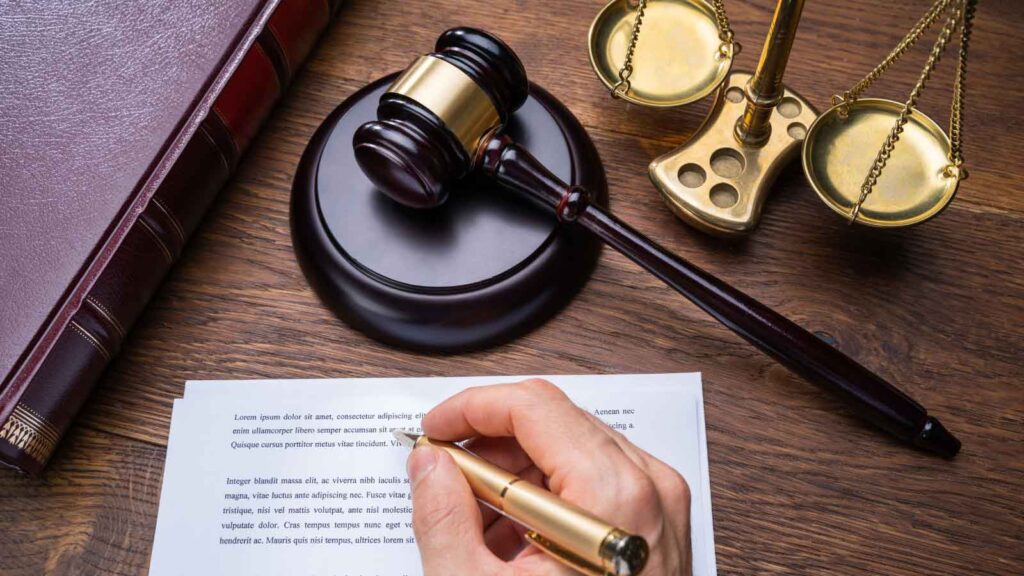If you’ve just received a federal court subpoena, you might feel overwhelmed, unsure of what to do next, and worried about the potential legal consequences of missing a deadline. Whether it’s a demand for documents, testimony, or both, the clock is ticking, and failing to respond in time can have serious repercussions. Even though you may have a certain number of days to respond, you should not wait until that deadline or even close to it to contact legal counsel. The process of preparing a legal response can take a few days or a week depending on the subpoena.
In this blog, we’ll explain the exact deadline for responding to a federal court subpoena and the steps you should take to protect yourself. We’ll also learn the importance of having the legal guidance of a business attorney with experience in handling this situation effectively.
Understanding Federal Court Subpoenas
A subpoena is more than just a request; it’s a court-ordered demand that requires you to provide specific information or testimony in a legal matter. In federal court, subpoenas are used to gather evidence, compel witness appearances, and secure documents vital to the case. They come in two primary forms: subpoenas for testimony and subpoenas duces tecum (for documents). Understanding the type of subpoena you’ve received is crucial to ensuring you meet your legal obligations and deadlines.
Here are key points to consider regarding federal court subpoenas:
- Subpoenas are legally binding: Ignoring or failing to respond can lead to contempt of court charges.
- Types of subpoenas: Testimonial subpoenas require your presence in court, while document subpoenas demand records or physical evidence.
- Scope of requests: Subpoenas may require personal and business-related information, depending on the case.
- Jurisdiction matters: Federal court subpoenas are governed by federal rules, which may differ from state court procedures.
- Response requirements: You must comply within a specified timeframe or file an objection or motion to quash if the subpoena is unreasonable.
Understanding the purpose and requirements of a federal court subpoena is the first step in managing your response effectively. It’s essential to act quickly, organize your documents, and seek legal counsel if unsure how to proceed.
Standard Deadlines for Responding to Federal Court Subpoenas
Responding to a federal court subpoena isn’t just about complying — it’s about doing so within a strict timeframe. Missing the deadline can lead to serious legal consequences, so it’s crucial to understand the standard timelines and what factors might affect them.
Rule 45 of the Federal Rules of Civil Procedure
Rule 45 of the Federal Rules of Civil Procedure governs the issuance and response to subpoenas in federal court. This rule outlines the requirements for serving subpoenas, the protections afforded to recipients, and the procedures for compliance. Specifically, it mandates that recipients of subpoenas must respond within a designated timeframe, either by complying, objecting, or seeking a court order to modify or quash the subpoena. Understanding Rule 45 is crucial in navigating your legal obligations effectively.
The 14-Day General Response Timeline
Under Rule 45, the standard timeframe for responding to a federal court subpoena is 14 days. This countdown begins on the day the subpoena is served, not when it was issued. Within this period, you must either comply with the subpoena’s demands or file any objections with the court. Failing to act within this general 14-day timeline window can expose you to penalties, including contempt of court. This strict timeline emphasizes the importance of immediate action once a subpoena is received.
Exceptions to the Standard Deadline
While having a specified response timeline is the general rule, some exceptions can alter this deadline. Certain circumstances may warrant an extension or a different response timeframe. These exceptions usually arise when compliance within the standard period is impractical or impossible due to specific challenges.
For context, here are critical exceptions to the standard deadline:
- Urgent court orders: Some subpoenas may demand immediate compliance, especially in cases where delays could harm the legal process.
- Trial-specific subpoenas: Subpoenas tied to an upcoming trial might specify a shorter response time.
- Volume of documents: If the subpoena requests extensive documentation, more time may be required for comprehensive document review and gathering.
- Complex cases: Legal matters that involve intricate details or sensitive information might justify an extended deadline.
If any exceptions apply, you must communicate with the court or the issuing party as soon as possible to request an extension or modification. Timely action can help you avoid legal complications and ensure your response meets all court requirements.
Factors Affecting Subpoena Response Deadlines
Several factors can influence how long you must respond to a federal court subpoena. Understanding these variables can help you better navigate the process and avoid the costly and time-consuming pitfalls of missing critical deadlines.
Geographic Considerations and Service Methods
The location where you receive the subpoena and how it’s served can impact your response deadline. Rule 45 considers the distance between the recipient and the location where compliance is required. If you’re located far from the court or the place where the documents or testimony are needed, the court may allow extra time for travel and preparation. Additionally, the service method — whether in person, by mail, or electronically — can affect when the response clock starts ticking. For instance, a subpoena served by mail might lead to slight delays in the response timeline due to postal delivery times.
Nature of Requested Information or Documents
The type of information or documents requested in the subpoena also plays a crucial role in determining how quickly you can respond. If the subpoena demands easily accessible records or straightforward information, you should comply with the standard deadline. However, the response time might be extended if the request involves confidential, sensitive, or hard-to-obtain data. This is particularly relevant when dealing with records that require significant effort to gather or verify. In such cases, it’s essential to communicate these challenges early to avoid penalties for delays.
Complexity of the Case and Volume of Materials
As mentioned, the complexity of the legal matter and the volume of materials requested can significantly affect your response time. In cases involving large-scale litigation, such as corporate lawsuits or multi-party disputes, the subpoena may require substantial amounts of documentation. Handling such cases often demands a more thorough and time-consuming process. For example, if you’re involved in a case requiring the production of thousands of documents, a simple response within 14 days might be unrealistic.
Having a business dispute lawyer can assist in these scenarios by helping you manage the legal requirements and negotiating for a reasonable extension if necessary. The more complex the case, the more critical it becomes to address the subpoena with detailed planning, prompt action, and professional guidance.
Procedures for Requesting Extensions or Modifications
If responding to a federal court subpoena within the standard deadline is not feasible, it’s essential to know that you can request an extension or modification. Taking the proper steps early can help you manage your obligations and avoid legal repercussions.
Communicating with the Issuing Party
The first step in requesting an extension or modification is to communicate directly with the party that issued the subpoena. This is often the quickest and most straightforward way to address timing issues. By explaining your situation and why you need more time, you might find that the issuing party is willing to agree to an informal extension without involving the court. This approach saves time and helps maintain a cooperative relationship, which can be beneficial for resolving business disputes or any ongoing legal matters.
Filing a Motion for Extension with the Court
If an agreement with the issuing party cannot be reached, the next step is to file a formal motion for an extension with the court. This motion should clearly outline why you require additional time, such as the complexity of the request or the volume of documents needed. Filing this motion before the original deadline expires is essential to avoid non-compliance issues. The court will review your request and decide whether to grant the extension based on the merits of your situation. Filing a motion adds a layer of formality and ensures that the judge documents and considers your request.
Circumstances Warranting Deadline Modifications
Not all situations will justify a deadline extension, but certain circumstances can make it more likely that the court will grant additional time. Courts generally consider extensions when the requested modifications are reasonable and supported by valid reasons. Knowing when and how to request these modifications can help you stay compliant without rushing your response.
Here are some circumstances where a deadline modification might be warranted:
- Large volume of documents: When the subpoena requires extensive documentation that cannot be collected quickly.
- Complexity of the information: In cases where the information requested is intricate or involves multiple sources.
- Geographic challenges: If the recipient is far from the court or where the documents are held.
- Confidentiality concerns: When the subpoena involves sensitive or confidential information that requires careful handling.
- Ongoing negotiations: If both parties are in discussions, that could impact the scope or timing of the subpoena’s demands.
In such cases, filing a motion for an extension or modification is not just about gaining more time; it’s about ensuring your response is thorough and accurate. Properly addressing these circumstances helps protect your legal interests while effectively resolving business disputes that may be at the core of the subpoena.
Best Practices for Managing Subpoena Responses
Effectively managing a subpoena response requires careful planning and prompt action. By following best practices, you can ensure compliance with legal obligations while minimizing potential disruptions to your personal or business affairs.
Immediate Actions Upon Receiving a Subpoena
When you receive a subpoena, the first step is carefully reviewing the document. Understand precisely what is being requested and note the deadlines. You should immediately calendar the response and internal deadlines to meet the court’s requirements. Additionally, inform any relevant parties within your organization, such as legal counsel or department heads, who may need to be involved in the response. Acting quickly and strategically from the outset will set the tone for a successful and timely response, reducing the risk of legal complications.
Organizing and Preparing Responsive Materials
Once you understand what the subpoena demands, gather and organize the necessary materials. Break down the subpoena’s requests into manageable tasks and create a clear plan to meet each requirement. Prioritize the most urgent items and allocate resources efficiently to handle the response. Ensure that your documents or information are complete, accurate, and properly formatted. It’s also a good practice to keep a copy of everything you submit to the court for your records. A structured approach will help you meet deadlines and demonstrate your diligence in complying with legal orders.
Seeking Legal Counsel and Assistance
Consulting with a law firm can be invaluable in complex legal situations or when the stakes are high. At Nick Heimlich Law, we understand the pressures and challenges of responding to subpoenas, especially when critical business interests are on the line. Our team can help you navigate the legal process, ensuring your response is thorough, timely, and compliant with all applicable laws.
Choosing Nick Heimlich Law is the best choice for these reasons:
- Proven experience: We have successfully guided clients through complex legal challenges, including subpoena responses.
- Personalized service: We tailor our legal strategies to fit each client’s unique needs.
- Experience in diverse industries: Our experience spans various sectors, making us well-equipped to handle legal matters.
- Responsive communication: We prioritize clear and prompt communication, keeping you informed every step of the way.
- Comprehensive support: From initial review to final submission, we manage the entire subpoena response process, allowing you to focus on your business.
Contact Nick Heimlich Law today if you’re facing a subpoena and need legal guidance. Let us handle the legal complexities so you can focus on what matters most—running your business.



